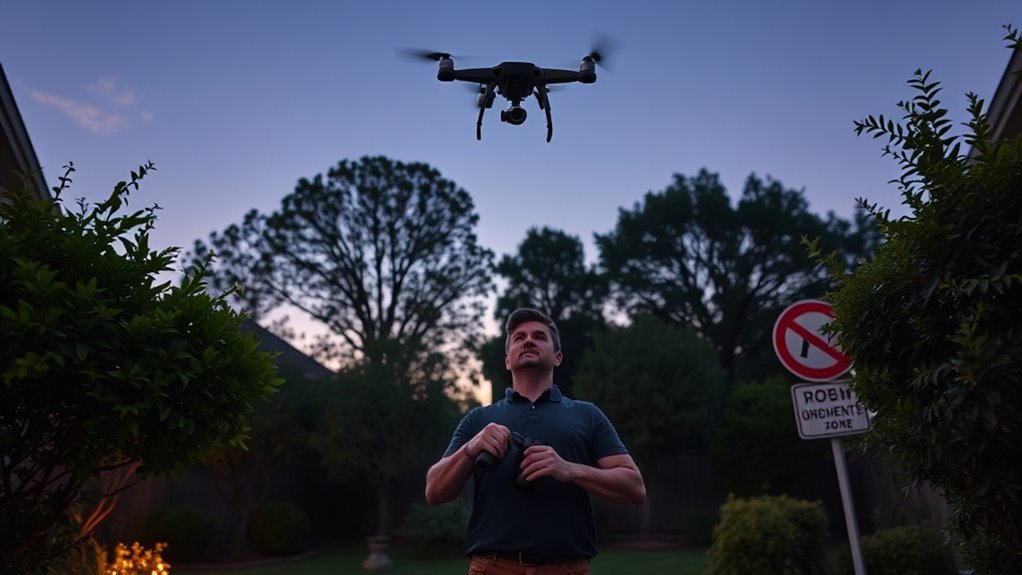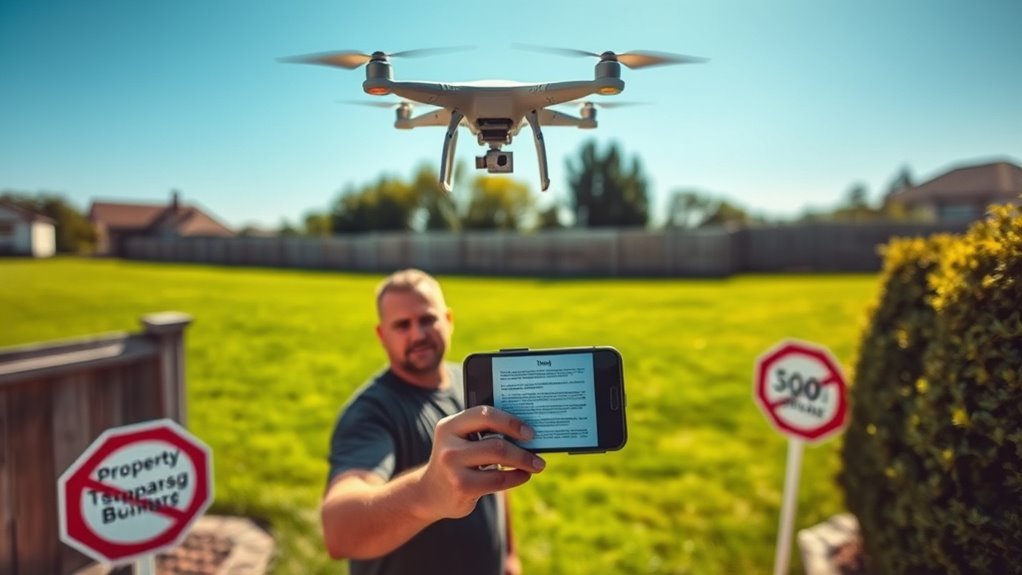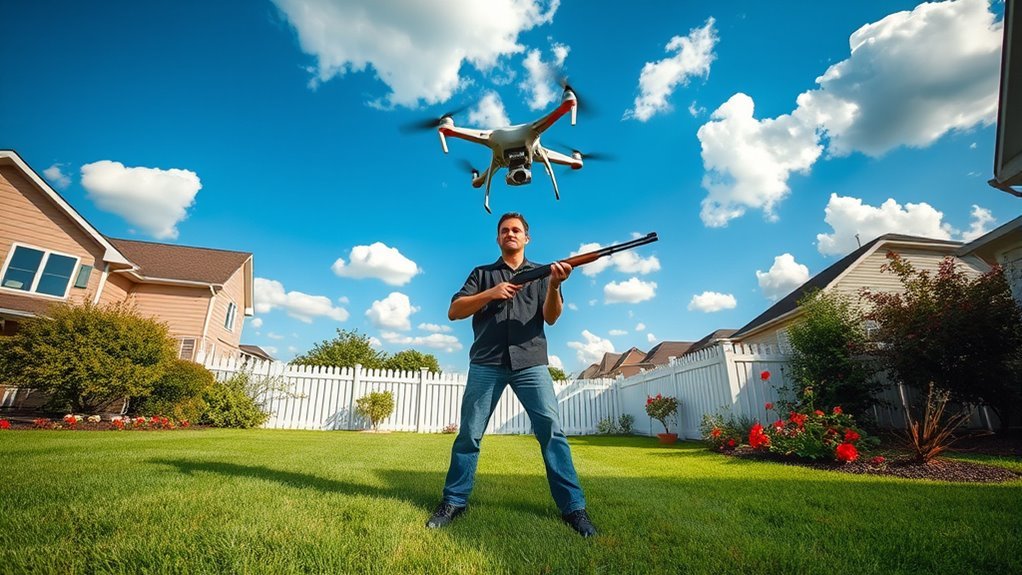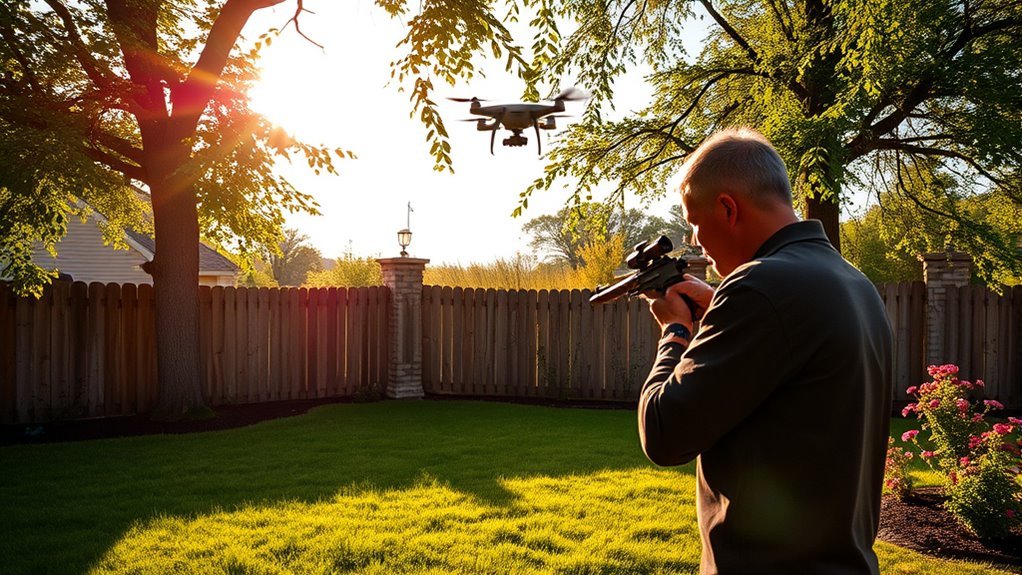To determine if you can legally shoot down a drone on your property, you need to understand federal regulations, state laws, and local ordinances. The FAA classifies drones as aircraft, and shooting one down can lead to severe penalties. Your property rights matter, but airspace ownership has legal limits. Consider alternatives like reporting the drone or using technology to address your concerns. If you want to explore the complexities further, there’s more to uncover about your rights and the legal landscape.
Understanding Drone Regulations: Federal Laws

When considering whether you can shoot down a drone, it’s vital to first understand the federal regulations that govern drone use. The Federal Aviation Administration (FAA) oversees airspace rights, which means that drones are generally considered aircraft operating in public airspace. Shooting down a drone could be viewed as a violation of federal drone regulations, leading to severe legal consequences. Additionally, the FAA grants specific airspace rights to drone operators, which complicates any claims of ownership or control over the airspace above your property. While the desire for freedom is understandable, maneuvering through the legal landscape requires careful consideration of these federal laws. Ultimately, understanding these regulations is important before taking any drastic actions against a drone. Furthermore, violating federal aviation laws can result in substantial penalties and legal issues.
State Laws Governing Drones and Aerial Surveillance

Although federal regulations set a foundation for drone operations, state laws add another layer of complexity to the issue of aerial surveillance and drone usage. You need to be aware that state drone regulations vary greatly, impacting your rights regarding drone activity over your property. Some states have enacted strict aerial surveillance laws, limiting how drones can be used for monitoring personal or private spaces. Understanding these regulations is vital, as they can dictate whether you can legally take action against unwanted drones. It’s essential to research your state’s specific laws, as they can either enhance your privacy rights or impose restrictions that could affect your freedom to act when it comes to aerial surveillance on your property.
Local Ordinances and Their Impact on Drone Use

Local ordinances can greatly influence how drones are operated within your community, as these regulations often address specific concerns related to noise, privacy, and safety. You need to be aware of local drone regulations that might limit flight times, areas of operation, or even the types of drones allowed. Municipal drone policies can vary considerably, reflecting the values and priorities of your community. For instance, some areas may impose stringent restrictions to protect residents’ privacy, while others might prioritize recreational use. Understanding these local rules is crucial for maintaining your freedom to enjoy your property without unwanted disturbances. Always check with your local authorities to verify you’re compliant and to safeguard your rights regarding drone use.
Property Rights and Airspace Ownership
Understanding local ordinances is just the beginning; property rights and airspace ownership also play a significant role in determining your ability to engage with drones. Your rights don’t just extend to the ground but also into the airspace above your property. Here are some key considerations:
- Airspace Boundaries: Generally, you own the airspace up to a certain height, often 200 feet.
- Property Entitlements: Know what your property entitlements allow regarding aerial surveillance.
- Local Regulations: Be aware of any specific regulations that might impact your airspace rights.
- Intent of Flight: The purpose of the drone’s flight can influence your rights to respond.
Understanding these aspects is essential for protecting your freedoms while maneuvering drone-related issues.
Assessing Privacy Violations and Trespassing
When a drone invades your airspace, it’s essential to assess whether it constitutes a violation of your privacy or an act of trespassing. Your privacy rights are paramount, and drone surveillance can easily infringe upon these rights. Consider the drone’s altitude and whether it’s capturing images or video of your private property. If it’s hovering over your yard, you might argue that it’s an invasion of your personal space. Additionally, assess if the drone’s operation disrupts your enjoyment of your property or poses a risk to your safety. Knowledge of local laws regarding drone surveillance can help clarify your stance. Ultimately, understanding these nuances will empower you to make informed decisions about your rights and potential actions. It’s also important to remember that strict regulations in places like Dubai may impact how you can respond to unauthorized drone activity.
Legal Consequences of Shooting Down a Drone
When considering shooting down a drone, you need to be aware of the legal landscape that surrounds this action. Federal Aviation Regulations and various state laws can impose severe penalties for unauthorized interference with aerial vehicles. Additionally, you could face liability and legal risks that go beyond just potential fines, impacting your personal and financial well-being. Understanding federal laws protecting aircraft is essential to avoid unlawful actions that could lead to serious consequences. Engaging in such actions could result in violations of the Aircraft Sabotage Act, which carries significant legal repercussions.
Federal Aviation Regulations
While it may seem tempting to shoot down a drone that encroaches on your privacy or property, doing so can lead to significant legal ramifications under federal aviation regulations. The Federal Aviation Administration (FAA) controls airspace classifications and requires drone registration, making it clear that unauthorized actions against drones can be problematic. Consider the following:
- Legal liability: You could face civil lawsuits for damages.
- Criminal charges: Discharging a firearm can lead to serious offenses.
- FAA penalties: Violating regulations may result in hefty fines.
- Public safety concerns: Shooting down a drone poses risks to others in the airspace.
Understanding these implications is essential to protecting your rights without jeopardizing your freedom.
State Laws Overview
Although federal regulations set a baseline for drone operation, state laws can impose additional restrictions or consequences for those considering shooting down a drone. Each state has its own drone laws that may define what constitutes reasonable force and establish penalties for unlawful actions. For instance, some states classify shooting down a drone as a criminal offense, while others might allow for certain legal defenses if you can prove a violation of privacy or trespass. It’s vital to familiarize yourself with your state’s specific laws, as ignorance of these regulations won’t protect you from legal repercussions. If you’re contemplating taking action against a drone, understanding state drone laws and potential legal defenses is essential to safeguard your rights and avoid unintended consequences.
Liability and Legal Risks
Shooting down a drone can lead to significant legal liabilities, especially if the action is deemed unlawful. You could face serious consequences, including:
- Criminal Charges – Depending on local laws, you might be charged with destruction of property or even firearm offenses.
- Potential Lawsuits – The drone’s owner could sue you for damages, claiming invasion of privacy or loss of property.
- Insurance Coverage Issues – Your homeowner’s insurance may not cover liabilities associated with shooting down a drone, leaving you financially exposed.
- Legal Fees – Defending yourself against lawsuits can be costly and time-consuming, draining your resources.
Understanding these risks is vital in making an informed decision about how to protect your property without stepping into legal trouble.
Frequently Asked Questions
Can I Recover Damages if a Drone Damages My Property?
Imagine your property as a fortress. If a drone crashes into it, you might recover damages through your property liability insurance, but check your drone insurance policy for specifics. Legal nuances can affect your claim’s success.
What Should I Do if a Drone Is Flying Over My Home?
If a drone’s flying over your home, consider your drone privacy rights and property rights. Document the incident, check local laws, and if necessary, contact authorities to address potential invasions of your personal space.
Can I Use Non-Lethal Methods to Disable a Drone?
While you might feel compelled to act against drone interference, it’s essential to contemplate non-lethal options. Employing methods like signal jammers or nets can effectively disable a drone without crossing legal boundaries, ensuring your rights remain intact.
Is There a Difference Between Commercial and Recreational Drones in Legality?
Yes, there’s a difference. Commercial regulations often impose stricter requirements, like licensing, while recreational guidelines offer more leniency. Understanding these distinctions is essential for traversing the legal landscape surrounding drone usage on your property.
How Can I Report a Drone Causing Disturbances in My Area?
If you’re facing drone disturbances, first document the incidents. Then, check local laws and follow appropriate reporting procedures, which may involve contacting law enforcement or aviation authorities. Your rights to privacy matter, so don’t hesitate to act.

